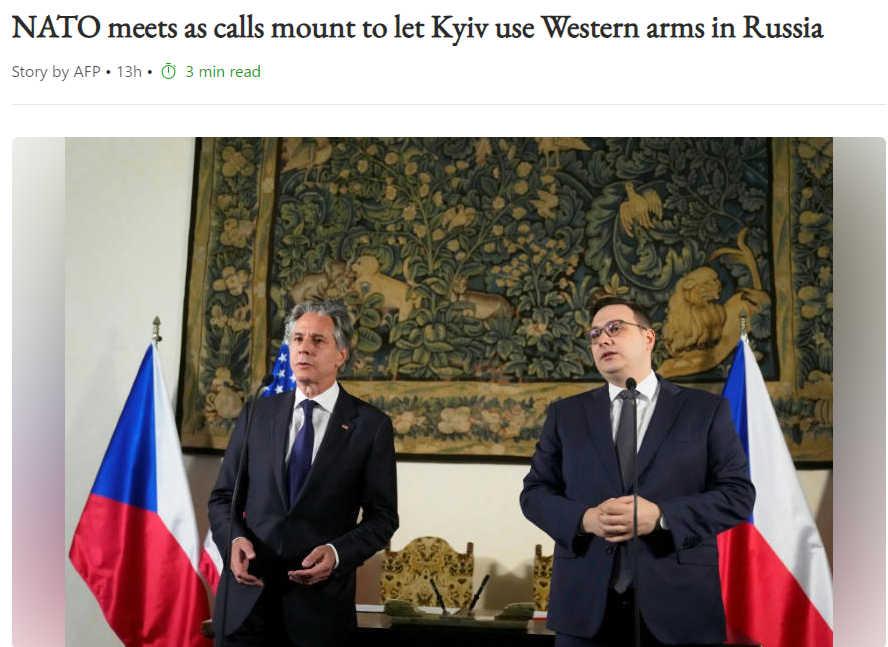At the opening of a meeting of the alliance’s foreign ministers yesterday, NATO commander Jens Stoltenberg advocated for allowing Ukraine to use Western weaponry to strike inside Russia, a move that Kyiv has requested but that Washington, its main ally, is now opposing.
The goal of the two-day meeting in Prague is to concentrate on efforts to finalize a package of support for Ukraine before the July NATO summit in Washington.
But the negotiations run the risk of being overshadowed by the raging controversy over allowing Kyiv to utilize weapons that Western backers have provided to strike inside Russia.
The goal of the two-day meeting in Prague is to concentrate on efforts to finalize a package of support for Ukraine before the July NATO summit in Washington.
But the negotiations run the risk of being overshadowed by the raging controversy over allowing Kyiv to utilize weapons that Western backers have provided to strike inside Russia.
Ukraine has been exerting pressure on its allies, especially the United States, to grant it permission to strike targets within Russian territory using the longer-range weapons they provide.
Britain and the Netherlands are among the nations that claim Kyiv has the right to use its weaponry to attack Russian military targets.
Espen Barth Eide, Norway’s foreign minister, confirmed his backing on Thursday, saying Kyiv shouldn’t have to battle “with one hand tied behind its back” on NRK television.
However, for a long time, the US and Germany have opposed permitting Kyiv to launch a border strike because they are afraid it will push them closer to open hostilities with Moscow.
Ahead of the opening dinner with ministers, Stoltenberg said, “The last weeks and months, most of the heavy fighting has taken place actually along the border between Russia and Ukraine.”
“Therefore I believe that time has come to reconsider some of these restrictions to enable the Ukrainians to really defend themselves.”
When he stated on Tuesday that Ukraine ought to be permitted to “neutralize” Russian bases that are used to launch attacks, French President Emmanuel Macron seemed to move things along.
Olaf Scholz, the chancellor of Germany, was less firm, stating that Ukraine should follow the law and that Berlin had not given Russia any weaponry.
The White House, on the other hand, stated that it continues to oppose Ukraine utilizing US weapons to launch attacks within Russia, while Secretary of State Antony Blinken made a suggestion that this position may alter.
Vladimir Putin, the president of Russia, has threatened to take “serious consequences” should the West sanction Ukraine.
“NATO member states, the United States, and capitals in Europe in recent days and weeks have been entering a new round of escalations in tensions,” Kremlin spokesman Dmitry Peskov said Thursday.
As Kiev fights to halt Russia’s onslaught in the Kharkiv region, proponents of Ukraine’s greater autonomy express hope that pressure from Washington and other quarters will lead them to reverse direction.
Jan Lipavsky, the foreign minister of the Czech Republic, said, “I understand the concerns, I understand that there are weapon systems which can be used quite far away.”
“But I feel that we are even moving on that in the international sphere.”
Ministers in Prague are working to devise a package of support that will satisfy Ukraine while its eventual membership in NATO remains a distant prospect, even as NATO partners struggle with that problem.
Following a strong push at a summit last year, NATO members, led by the US and Germany, have advised Kyiv that it should not anticipate any real progress toward joining the alliance in Washington.
Rather, Stoltenberg is pressing alliance partners to commit to a specific amount of future aid to Ukraine over a period of years.
He proposed an overall goal of 100 billion euros ($108 billion) over five years last month, but his friends were perplexed as to what that would entail and it fell flat.
According to diplomats, discussions are still going on as allies attempt to determine the scope and format of any promises.
A proposal for NATO to take over from the US in coordinating armament deliveries to Ukraine is one area where the alliance does appear closer to agreement.
Because NATO has refrained from getting involved in arms delivery out of concern that it would embolden Russia, Washington has been in charge up until this point.
Making the alliance accountable as a whole, according to supporters, may protect future supplies from a potential Donald Trump comeback.
However, some worry that it would merely result in more red tape.
“We plan to put our support on a firmer footing, including with a greater NATO role in coordinating security assistance and training, as well as a multi-year financial commitment,” Stoltenberg stated.

